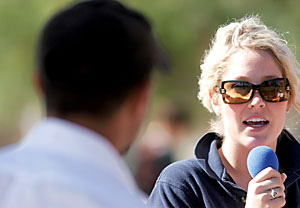 |
|
Jacob Konst/Arizona Daily Wildcat
|
Erin Hertzog, ASUA executive vice president and a journalism junior, discusses her views of why students are apathetic yesterday at Heritage Hill to a handful of students.
|
|
|
By Nick Smith
Arizona Daily Wildcat
Thursday, November 17, 2005
Print this
Turnout poor for apathy discussion
Of the nine students sitting on Heritage Hill yesterday at noon, one was sleeping, two were talking, three were eating lunch and three were listing to a talk on student apathy.
The dialogue on why students are so apathetic was the last Debate Club discussion of the semester, said club President Tawfik Maudah, a philosophy senior.
Between 20 and 40 students attended the debate at various times, many opting to sit in the chairs instead of the grassy area of the Alumni Plaza.
Maudah said he figured the turnout would not be that high, even though student apathy is an issue worth discussing.
"Unless it's a bikini show," he said. "Then, you'll have thousands of people here."
Student leaders were on hand to give their take on student apathy in regard to low turnouts during campus elections.
"We do a good job of getting the word out," said Erin Hertzog, Associated Students of the University of Arizona executive vice president and a journalism junior. "I don't think we do a good job of making it accessible to vote."
Hertzog said part of the problem is in student candidates not taking strong stances on platforms.
"Everyone is really safe on how they run," she said. "There are these risks that aren't being taken."
Fernando Ascencio, director of the Arizona Students' Association, said he thinks students are apathetic because they do not see results.
"People don't want to waste their time on something they won't see results," said Ascencio, a political science senior.
Campus organizations like ASUA, ASA and the Debate Club are there to provide outlets for people who want to get involved, Ascencio said.
"Ultimately we have to make it seem like this is a place where you can do something if you want to," Ascencio said.
Reaching out to students is another roadblock to countering apathy, Hertzog said.
"You really have to hand things to students on a silver platter to get them to come," she said.
Richard Weyker, an engineering freshman, said it is up the individual to find various ways of being informed.
"It's a personal responsibility everyone has," Weyker said. "If your idea of getting information is watching five minutes of CNN, it's not enough."
Others at the debate said they felt communication lines need to be open.
"How many people spend five minutes of their day in having meaningful communication?" said Eric Austin, a UA alumnus who came to campus for the debate. "The more we keep questioning, the more of these answers we'll get."
Leslie Johnston, senior art director at the Advancement Office, gave Maudah the idea of hosting a forum on student apathy.
"As a child of the '60s, this is your time to question everything," Johnston said.
Johnston said unfortunately, something drastic like a draft would make more people care about current affairs.
"You only pay attention to gas prices when they go up," Johnston said.
Despite the low turnout, Maudah said he was confident having the discussion was the right thing to do.
"The point is not to have hundreds or thousands of people," he said. "The point is to raise these issues."
